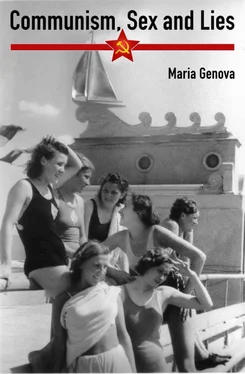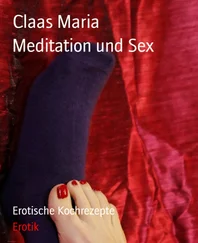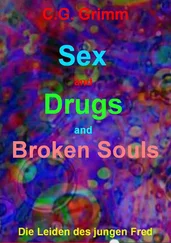I tried to think of moving house as a possible option, but the party’s strict housing policy didn’t take personal situations into account. Quite a lot had to happen if you wanted to get permission to move to another town. For example, you had to have a husband who was already an inhabitant of that town, but of course a recently divorced and bitter woman had no intention of starting a new relationship.
I pretended that we were not so prudish as the previous generation, but apparently, I was wearing blinkers, because Wanja’s story was proof that the moral views in the villages had not substantially changed. That reminded me of my own parents. Through prudishness I had almost not been conceived and once I had been, I was actually an accident. My mother was halfway through her training at the music academy and had no desire for children. It was nearly a miracle that she and my father had made it so far. My mother’s prudishness knew no limits and each time he got intimate, she didn’t want to see him for a while. The worst thing was that once my mother listened to a secret tape, on which her loved had taped a romantic conversation with a girlfriend. He invited her to visit him, but she claimed it was impossible. ‘The only thing that’s impossible, is trying to remove your underpants over your head,’ was my father’s reaction.
My mother was outraged. She had been raised with values and norms and could not stand his vulgar remark, so she broke off the relationship. My father sent flowers, apologised a thousand times and even got her parents involved as mediators. He made sure that he didn’t blow his second chance, which he was finally given.
Thanks to the moral accomplishments of communism my generation also grew up protected, but it was now common to be intimate with your steady boyfriend and that you didn’t have to wait before marriage to sleep with each other. Except in the villages, where prudishness formed an immense social problem. We played the communist game without giving it much thought, but girls like Wanja were always the losers, because problems were never discussed. As prisoners of the system we told white lies of we wanted to keep something silent and if we had to tell the truth we also lied to prevent complications. We were passengers in a car, driven by a drunk party leader, who ignored all the rules. You don’t just get out of a car that’s driving at high speed.
‘Mer, you’re just like a butterfly. Each time I want to catch you, you fly away,’ Dimitar moaned, after I had agreed to carefully build on a kind of intimate friendship.
‘Maybe you want to catch me too fast?’ I replied.
‘Too fast! Until known I have shown the patience of a saint, but apparently, you haven’t noticed.’
I saw the vein in his neck beat intensely. Anger and passion were a remarkable combination.
‘Mer, I’ve fallen in love with you. Do you love me too?’ he whispered.
It was as if I had been waiting for that question. Dimitar sounded so hopelessly pathetic that it made me shiver. Where was the self-assurance, the intriguing personality, that I had fallen for? I found the idea that he wanted to claim me for himself suffocating, because I felt so happy without a steady relationship.
‘Luck is just like decorating a home,’ Olga had said once. ‘Throw away all the rubbish and give all the valuable things pride of place.’ Dimitar didn’t belong in my soul’s home. It was strange that I felt so attracted to him without loving him.
‘Give your friend everything his heart desires and at the same time he’ll realise that there is more,’ I said out loud.
Dimitar looked at me questioningly. I was not planning to give a straight answer to his declaration of love. I was afraid that he would not accept it, so I asked him about his future plans.
‘I want to leave this country as soon as possible. I would love to go to America,’ he replied.
I was amazed by the calm way he talked about it. Communism was already exhibiting some cracks, but feeling to the West was still serious. The funny thing was that Dimitar had predicted his future without a crystal ball. A few years later he married in America, a marriage of convenience. Once he had found a good job, he got a divorce. I heard from his sister that he soon remarried, this time out of love. What surprised me the most was the end of the story: Dimitar had gotten a second divorce and went to live as a monk in a monastery. How large was the change from playboy to monk, I asked myself?
I didn’t see myself studying holy scripture, but life still had its surprises. Funnily enough fate also took me to America. Admittedly in a roundabout way, but I did go there. I was almost hypnotised by the flashing and rolling sea of lights of Las Vegas.
A limousine stopped close by. No one got out. Out of curiosity I tried to catch sight of the passenger, but that was impossible. A few hours previously I had been driven through Las Vegas in a similar limousine with tinted windows and I could see everyone, but no one could see me. Now the tables were turned: the passengers could see me, but I couldn’t see them. I recalled the Bulgarian limousines: all black Russian cars, reserved for the party elite. For the ordinary mortals, bureaucracy was part of the car purchase: you placed your name on an endless list, put down a deposit and hoped that one day you would actually get it. There were very little cars imported and my parents were lucky to be able to buy one after seven years. You often had to wait ten years or longer to buy a Lada or Trabant.
We could even laugh at this undesirable situation. ‘You can pick your Trabant up in exactly ten years’ time,’ the garage owner says. ‘Would you prefer the morning or the afternoon?’
‘What do you think is better?’ the buyer asks.
‘In the afternoon, because the mechanic will be present then.’
We were eligible for a ‘ZAZ’, a Russian car with the appearance of a bumper car. Of course, we would have preferred a Lada, but then we would have to wait for another few years. My father didn’t want to buy a second-hand car, because that was more expensive than a new one. This is the way the communist market forces worked: if you didn’t want to wait for years, you had to pay more.
In any case I was pleased it wasn’t a Trabant. I had sat in my uncle’s Trabi enough times to know that the two-stroke engine completely overshadowed the radio. It was simply impossible to hold a conversation at a slightly increased speed, or you had to shout the whole time. The suspension was so hard that every hole in road made my head hit the roof of the car. Some Trabant passengers got queasy from exhaustion fumes because the air for the radiator passed through the exhaust.
My uncle claimed that he had the longest four-wheeler: three metres of car and ten metres of smoke. The Trabant did seem to have been designed to ruin the air. The only good thing about it was that it was of a type of plastic, Duroplast, which meant it lasted longer. This way the drivers could avoid the holes in the road following the necessary repairs. This was quite tricky and favourite hobby of every experienced driver. Only beginners, such as my uncle, braced themselves and steered the Trabant straight through the holes, so as not to end up on the wrong side of the road. That wasn’t any safer, because once when he was driving the clutch came loose in his hands. This was usually mounted on the steering column but after a few large holes it had spontaneously broken off.
Although we were very happy with our ZAZ to start off with, it seemed it was just as bad as a Trabi. On our way to the Black Sea we had to stop regularly to let the car breathe. My father would pop the hood and wait until the engine had cooled down before we drove any further. Despite these precautions, about halfway the engine overheated anyway. Even worse: one of the parts had melted and we had to spend the night in the garage, because working quickly wasn’t in their vocabulary.
Читать дальше












